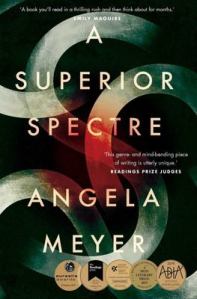Australian author Angela Meyer’s A Superior Spectre may be described as a work of soft science fiction where technological innovations are far less important than the human experiences affected by them. The curious relationship between the story’s two protagonists is established after a piece of experimental technology is employed to form a psychological link between them.
In this book published in 2018, Jeff, from 2024, is dying. Haunting by memories and the shame of his dark desires, he flees Australia’s ID-implant security systems and hides in remote Scotland with a service robot. It is to this “appliance” that he dictates his life’s stories as some sort of confession.
Also recorded by the robot is Jeff’s account of his mind-travel to Scottish Highlands of the 1860s, where he occupies the mind of a young woman named Leonora. As the isolated, self-pitying and physically deteriorating Jeff ignores the warning that he can only do so three times, he is utterly and irrevocably changing Leonora’s life.
The Leonora Before is content with her life outdoors, endlessly curious about the crops, gardens and farm animals. Fascinated by how “inquiry brought knowledge while it also unearthed new mysteries”, she is in the process of befriending the local laird when her father decides to send her to Edinburgh, a sooty city. She laments:
“How does one get used to this? The relentless black, making teeth look absent and turning live colour people into photographs… Here, in Edinburgh, it comes from inside and out, clashes heavily in the air, and sinks, liquid-like, into skin and clothes, furniture and floors. It coats he back of the throat and the hides of animals. It even seems to enter the blood.”
Leonora’s ability to adapt to her new life is increasingly shadowed by an unspeakable presence that lurks behind her eyes. Hallucinations of unfamiliar visions, sounds and voices cloud her mind’s eye, forcing her to doubt her own sanity. Worse, constantly under the guardianship of her aunt to prevent any possible unsanctioned liaison with unsuitable men, she is physically, mentally, psychologically and sexually trapped.
Indeed, although the novel’s narrative is jointly shared by the two protagonists, readers cannot help but sympathise with Leonora, whose contemporaries embrace the enlightenment and progress in medicine and engineering but remain stubbornly chained by the Victorian patriarchal paradigm. Though saddened by her plight, Jeff, in his own words, continues to allow his impulses to “infect” her because it is “addictive”.
The author’s writing is lyrical and visceral, and very literary, often with artistic musings that are delightful and intriguing. These almost make Jeff a likeable character, with these words from him as an example:
“Ghosts held the answers to a realm beyond that I sometimes suspected was an actual, physical dimension, and at other times understood as a layering within one’s own mind: that you created the ghosts from your unconscious. It made them no less frightening. Now I am a part of my own ghost story. I am the ghost, even before death. I straddle realms… I am departed but living on in the mind of a young woman.”
As Leonora says: “It is easier to imagine that you are possessed than to face the possibility your mind may be fooling you.” In this sense, A Superior Spectre may be seen as portraying the eternal struggle between the body and the mind. It is an acquired taste.


